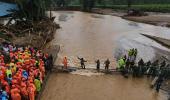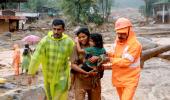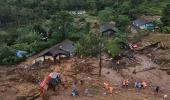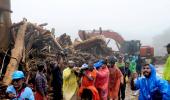'Except that the population was much less.'
'I remember my uncle and family moving away from the base of a hill whenever it rained for more than a couple of days without a dry day in between.'
'Perhaps the older generations knew if it rained for more than a certain time, they must pack up to a camp or to a relative.'
'As some of the interviews of the survivors on the Malayalam television channels show, the elderly people had a premonition a tragedy would happen, and those who acted on those premonitions survived.'

"If volcanoes and hurricanes can be predicted, and people shifted in advance in developed countries, why can't we have sensors in the mountain tops and slopes to give early warning signals?" asks former editor of Caravan Dr Vinod K Jose.
Dr Jose grew up in Wayanad, and returned after working in New York and New Delhi for twenty five years. He is currently working on a book on Indian politics.
In the concluding part of his interview to Rediff.com's Archana Masih, Dr Jose speaks about why policies based on science that preserve our inherited natural assets should be the need of the hour.
- PART 1 of the interview: 'Climate Change Is The Main Villain'
What damage has the construction of tourist resorts done to this sensitive zone? How responsible are such projects for the tragedy?
What are some of the other 'development projects' that have contributed to such a disaster?
Clearly, inquiry must be carried out to see if there are tourist projects that have come up violating existing laws.
The existing laws themselves are quite stringent. But detailed inquiries must be carried out to see if practices or businesses are violating laws. From mindless tourism, governments must promote responsible tourism.
The latter is possible, as we see in many western tourist spots, and even in countries like Indonesia. From the usage of plastic to automobile to construction rules, it is possible to promote tourism without harming the environment.
People must be given the opportunity to enjoy the beauty of nature, Wayanad that way is very blessed with greenery, rivers, ancient caves, wildlife etc.
The need of the hour is, without destroying the tourism economy, how to fix all the problems that such an industry throws up.

Reports say Wayanad had record footfalls this time. Living in Wayanad, did you feel so?
Has unplanned tourism damaged this eco-sensitive region considerably?
A few kilometres from where the current tragedy took place is Lakkidi, the village that used to record the highest rainfall in the world for many years together in the nineteenth and the twentieth century.
I remember growing up in Wayanad, it used to rain every second day. After a gap of twenty five years, I returned to Wayanad recently. But that non-stop rain that Wayanad was known for had disappeared.
This season, from June first onwards, I noticed that the rain was consistent, if not pouring down, drizzling always, and in no time, muddy puddles got formed, and roads became streams. It reminded me of the kind of rains in my childhood.
The flipside of such non-stop rain is that the soil would become loose, the trees would have taken the shock of the winds, making the roots weak, the rocks shake and can get misplaced at the slightest slip.
Landslides used to be quite frequent in the olden days too, except that the population was much less. I remember my uncle and family moving away from the base of a hill whenever it rained for more than a couple of days without a dry day in between.
Perhaps the older generations knew if it rained for more than a certain time, they must pack up to a camp or to a relative. As some of the interviews of the survivors on the Malayalam television channels show, the elderly people had a premonition a tragedy would happen, and those who acted on those premonitions survived.
In the absence of people with such spiritual connection to the soil, weather and waters, the warnings must have come using technology and science. But it is sad that we do not develop science to help people in India.
If volcanoes and hurricanes can be predicted, and people shifted in advance in developed countries, why can't we have sensors in the mountain tops and slopes to give early warning signals?
The fact remains that our governments do not care for people. When our leaders realise a photo-op with a just-escaped group of people moving from a landslide would have the same political currency of a photo-op with a rocket going to orbit, we would be in a better position.
For now, finding solutions to fix landslides or to stop bridges from collapsing is rarely the thing for our current breed of leaders.

What alarm bells does this tragedy sound for the Wayanad-Kozhikode tunnel road project which is supposed to commence construction soon?
Environmentalists have campaigned against it but the project is seemingly going ahead -- what dangers does this portend?
I'm not an expert to comment on this. This project will need proper scientific study, especially in the light of the current tragedy.
The stretch of mountains from Anakkampoil in Kozhikode and ending at Meppady in Wayanad is the upper crest of the proposed tunnel.
People must be taken into confidence with proper studies before going ahead with any such plans.
If a Pragati Maidan to Ring Road tunnel of one-kilometre-long in the national capital is getting flooded in every drizzle since its inauguration, I really don't trust our engineering contractors winning business deals these days to develop a nine-kilometre long tunnel, cutting massive rocky mountains in the Western Ghats.
As a citizen, I have my doubts and fears.

Are ecological concerns being ignored without any concern for the future in the race of 'development'?
In ecologically fragile areas like Wayanad -- or in other places like Uttarakhand, Himachal which have seen similar disasters, what should be the ideal way or the mechanism to harness sustainable development and minimises environmental damage?
How can such disasters be prevented?
As they tell us, the eastern Himalayas and the Western Ghats are in the list of the world's eight 'hottest hotspots' of biodiversity.
In India, if we do not recognise what that means to make policies, without making it a human rights violation issue of the people living there, then we really don't know what we are doing with the natural assets we inherited.

The bridge connecting Chooralmala with Mundakkai over the Iruvanipzha river is open to traffic and handed over to the civil administration, August 1, 2024. Photograph: ANI Photo
Expressways, tunnels, high speed trains, airports... are largely seen as the symbols of development.
Important as they are, do you feel that these projects get far more attention at the cost of health, education and other concerns that affect the people?
I believe better roads and tunnels must be built when there's a need and if it is sanctioned by science.
Trains, for instance. The more Vande Bharat services we start, worse the regular train services become. So the priority for a politician is to start something new and big, as opposed to fixing an existing service. That thinking is not coming from a good place.
Feature Presentation: Aslam Hunani/Rediff.com











 © 2025
© 2025